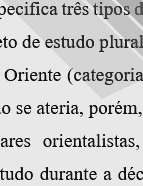

................................
The word ‘orientalism’ first appeared in a dictionary in Portugal in the fourth volume of Grande Diccionario Portuguez; ou Thesouro da Lingua Portugueza, published in 1873, as explained by the research of Manuela Delgado Leão Ramos (António Feijó e Camilo Pessanha,2001, pp. 18-19). It is in no way a coincidence that this was the year of the first International Congress of Orientalists, held in Paris. Imported via the French, and more specifically, as Ramos suggests (Idem, p. 19), from the dictionary of Émile Littré (1873-1874, p. 859), it was then defined as the “body of knowledge, philosophical ideas and customs of Oriental peoples.//Science of orientalists, knowledge of Oriental languages”. In turn, the meaning of the term ‘orientalist’ was given as a “man versed in the knowledge” of those languages (Vieira, Grande Diccionario, 1873, p. 583). If orientalism is designated as a field of study whose diversified subject matter – the languages, customs, and ideas of the people of the Orient(s) – appears to raise it to the status of a science, it is no less relevant that the term is also associated with a specific gendered domain, the masculine, even if this reflects more widely prevailing attitudes of the period. Indeed, the male-dominated practice of orientalism would continue, largely unchallenged, in the discursive production concerning the East in Portugal until the end of the twentieth century.
This definition resonates with that given by the Sanskritist Guilherme de Vasconcelos Abreu in his address to the members of the Portuguese delegation to the first Congress of Orientalists, in which he discussed the constitution of an Association for the Promotion of Oriental and Glottological Studies in Portugal. Seeking to expand the reach of Oriental studies, including linguistic (or glottological) and ethnological sciences, this Association would, in accordance with article 3 of its Statutes, undersigned by A.A. Teixeira de Vasconcelos, Augusto Soromenho and Vasconcelos Abreu, welcome “any individual of either sex that wishes to be a member” (Correspondência... com J. Possidónio da Silva, 1874, vol. 7, doc. 986 bis). Disregarding both gender and professional distinctions – an uncommon approach for the time – the Association’s scientific openness mirrors its intention to bring together the largest possible number of names in order to give visibility to a budding orientalist community eager to participate in debates on a national level. It would appear, however, that these efforts did not achieve the desired result, as records of the Association’s activities only exist for the period between 1874 and 1875, and the organization did not leave behind any work worthy of mention. Vasconcelos Abreu further contends that “Orientalism is not an object of mere curiosity; it is not a matter for entertainment and idleness. Orientalism is the sum of the linguistic, ethnological, and historical knowledge about the peoples of the East, both ancient and modern” (Exposição, 1874, pp. 8-9). Rejecting any semblance of dilettantism incompatible with a scientific stance, the Sanskritist specifies three types of knowledge, which, when combined, would offer a more comprehensive vision of an inherently plural object of study. According to this contention, the phenomena addressed by this field share the fact that they originate in or belong in some way to a single geographical region – the Orient (a category determined in function of the position of the European observer) – but are not necessarily tied to the past.
